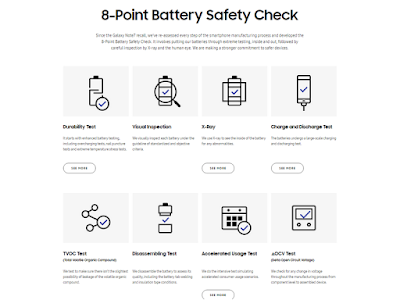
Samsung has a new "8-Point Battery Safety Check" process in tow, aiming to avoid future issues like the Galaxy Note 7 disaster.
The Samsung Galaxy Note 7 launched as an impressive flagship with top-notch specs, but it soon turned out to be a massive liability because of its exploding battery. Samsung was forced to recall the product, assess the issue, relaunch the device with a different battery, and recall it again because the new battery was still not safe.
After two Galaxy Note 7 recalls over exploding batteries, Samsung found itself in a really difficult position. The company conducted extensive investigations into the matter and it just released the official results of the Galaxy Note 7 probe, pointing at two different flaws that caused the explosions leading to the two Galaxy Note 7 recalls.
Reassessing The Manufacturing Process
The whole Galaxy Note 7 fiasco prompted Samsung to reassess the manufacturing process to ensure that its future devices are safe and the company has now come up with the 8-Point Battery Safety Check.
The new process aims to ensure the safety and reliability of Samsung devices and it entails a more rigorous set of battery tests and inspections.
Samsung 8-Point Battery Safety Check
"Since the Galaxy Note 7 recall, we've re-assessed every step of the smartphone manufacturing process and developed the 8-Point Battery Safety Check," says Samsung. "It involves putting our batteries through extreme testing, inside and out, followed by careful inspection by X-ray and the human eye. We are making a stronger commitment to safer devices."
As part of this more rigorous testing process, Samsung will first conduct a durability test, pushing the battery to its limits to see how much it can endure. This includes overcharging the battery, puncturing it with a nail, and subjecting it to extreme temperatures.
The company will also conduct a visual inspection as well as X-ray the batteries so that Samsung engineers can find any potential abnormalities within the units. Samsung will also charge and discharge the batteries repeatedly, on a large scale, and conduct a Total Volatile Organic Compound test to further check the batteries' endurance.
Next up, company engineers will disassemble the battery units to assess their quality, including the state of the battery tab welding and insulation tape - two essential parts of a safe battery.
To simulate accelerated usage by device owners, the company will conduct an intensive test to see how the batteries fare. Lastly, a Delta Open Circuit Voltage test will check if there's any change in the batteries' voltage all throughout the manufacturing process, from the moment they hit assembly lines until the final product is made.
The more thorough 8-Point Battery Safety Check should ensure that the Samsung Galaxy S8 and other future Samsung devices don't pose the same safety threats as the ill-fated Galaxy Note 7.
That said, a Samsung executive confirmed that the Galaxy S8 will not make its debut at the Mobile World Congress 2017 event that takes place in late February-early March in Barcelona. Earlier rumors suggested as much, indicating that the Galaxy S8 would hit the scene in April.




No comments:
Post a Comment